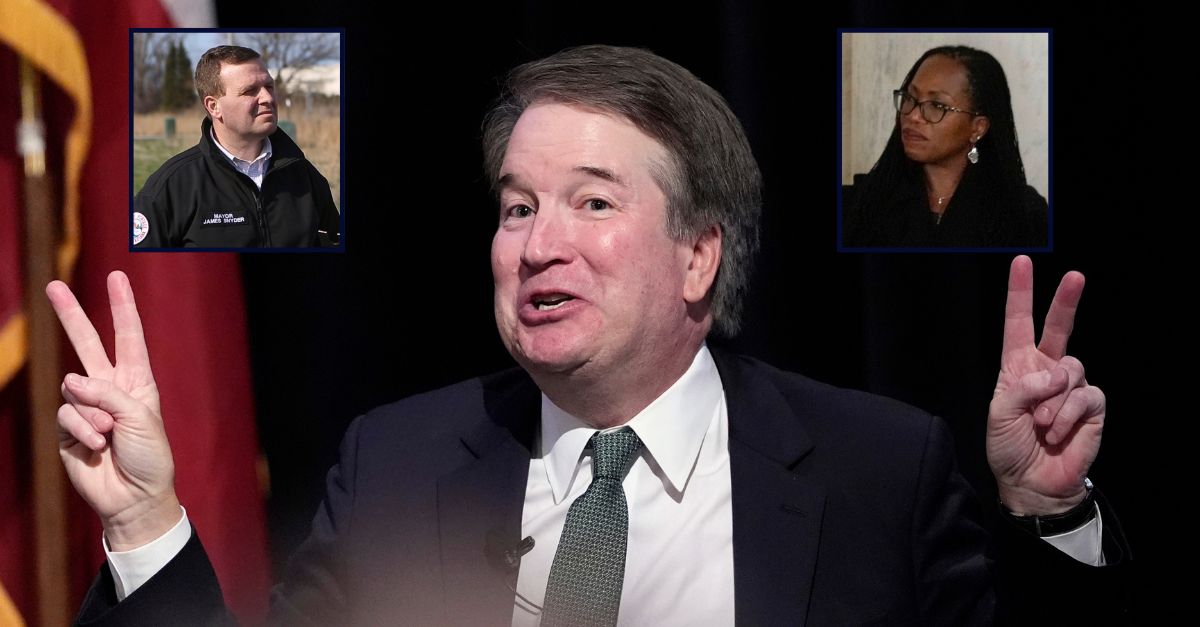
Supreme Court Justice Brett Kavanaugh makes air quotes as he answers questions during a judicial conference, Friday, May 10, 2024, in Austin, Texas. (AP Photo/Eric Gay). Inset left: Portage, Indiana, Mayor James Snyder takes questions on April 12, 2017, from reporters about a chemical spill in Lake Michigan. (John J. Watkins /The Times via AP). Inset right: Supreme Court Justice Ketanji Brown Jackson attends a private ceremony for retired Supreme Court Justice Sandra Day O’Connor before public repose in the Great Hall at the Supreme Court in Washington, Monday, Dec. 18, 2023. (AP Photo/Jacquelyn Martin, Pool)
The Supreme Court ruled Wednesday that “gratuities” differ from “bribes”— and that a federal anti-bribery law does not prohibit an Indiana mayor from receiving a hefty payment from a trash truck company as a potential kickback.
The justices voted 6-3 along ideological lines that tokens of appreciation after an official act differ from bribes beforehand, and that any prohibition of gratuities should be left to state and local legislation.
Section 666 of Title 18 makes it a crime for state and local officials to “corruptly” solicit, accept, or agree to accept “anything of value from any person, intending to be influenced or rewarded” for an official act.
In 2013, the City of Portage, Indiana awarded two contracts to Great Lakes Peterbilt, a local truck company, to purchase trash trucks for about $1.1 million. Bribery is a crime under Indiana law. The next year, Peterbilt cut a $13,000 check to James Snyder, who was the mayor of Portage at the time the contracts were awarded.
Snyder said the check was a payment for his consulting services, while the FBI maintained it was a gratuity for the trash truck contracts. Although Indiana never charged Snyder with a crime, federal authorities prosecuted the former mayor. Snyder was convicted and sentenced to one year and nine months in prison.
On appeal, Snyder argued that the federal law only criminalizes bribes before an act, but not gratuities after the fact.
Justice Brett Kavanaugh penned the opinion for the Court’s six-member majority in which he said the federal bribery law should not be read in a way that would “subject[] 19 million state and local officials to up to 10 years in federal prison for accepting even commonplace gratuities.”
Kavanaugh explained that while American law generally treats bribes as “inherently corrupt and unlawful,” the legal treatment for gratuities is “more nuanced.”
Kavanaugh and the majority sided with Snyder, reasoning that the federal statute and its history along with interests of maintaining state sovereignty all favor reading the statute only to cover bribery.
Justice Neil Gorsuch joined the majority, but also wrote a solo concurring opinion in which he had a slightly different take on the federal law in question. Gorsuch said that “any fair reader of this statute would be left with a reasonable doubt about whether it covers the defendant’s charged conduct,” and that when such uncertainty is the case, “judges are bound by the ancient rule of lenity to decide the case as the Court does today, not for the prosecutor but for the presumptively free individual.”
The legal principle to which Gorsuch referred — the “rule of lenity”— is the concept that any time a law is ambiguous, courts have the responsibility to interpret it in the manner most favorable to the defendant.
Justices Ketanji Brown Jackson, Sonia Sotomayor, and Elena Kagan were entirely unconvinced by what they said was an “unnatural reading” of the federal statute. The three dissented via an opinion authored by Jackson.
The justice began with a statement on government corruption:
Officials who use their public positions for private gain threaten the integrity of our most important institutions. Greed makes governments — at every level — less responsive, less efficient, and less trustworthy from the perspective of the communities they serve.
She then moved on to a biting comment for her fellow justices: “Snyder’s absurd and atextual reading of the statute is one only today’s Court could love.”
Jackson called Kavanaugh’s purported concerns of federalism “nonexistent” and said that his prioritizing Indiana’s rights over federal law, “is a quintessential example of the tail wagging the dog.”
Jackson reasoned that Snyder’s $13,000 payment was prohibited by the statute because the issue isn’t the timing of the payment, but rather, the underlying corruption. The justice then put it in simpler terms, explaining what the statute meant when it prohibited the corrupt acceptance of “anything of value from any person, intending to be influenced or rewarded.”
[E]veryone knows what a reward is. It is a $20 bill pulled from a lost wallet at the time of its return to its grateful owner. A surprise ice cream outing after a report card with straight As. The bar tab picked up by a supervisor celebrating a job well done by her team. A reward often says “thank you” or “good job,” rather than “please.”
Furthermore, Jackson said, the majority’s “fretting” over the thousands of innocent government officials that would be at risk based on her reading of the statute, “falls flat, especially in the context of this case.” Jackson elaborated that the statute already exempts commonplace gratuities, and therefore acceptances of “gift cards, burrito bowls, and steak dinners” will continue to be safe from prosecution.
As for Snyder himself, Jackson noted that he put an unqualified friend in charge of the bidding process who then tailored the bid specifications directly to Peterbilt. After he received the $13,000 payment, Snyder gave one set of investigators a story about information technology and health insurance consulting services, then a different explanation to another set of investigators. Meanwhile, employees at Peterbilt testified that Snyder never performed any consulting work at all for the dealership.
Jackson remarked that, “the majority isn’t much worried about what happens to Snyder.” She concluded by acknowledging that she “wholeheartedly agree[s] with the majority’s suggestion that, because employees of those governments are our neighbors, friends, and hometown heroes, federal law ought not be read to subject them to prosecution when grateful members of the community show their thanks,” but by also noting that Snyder’s case simply does not raise facts of that nature.
You can read the full opinion here.
Have a tip we should know? [email protected]








